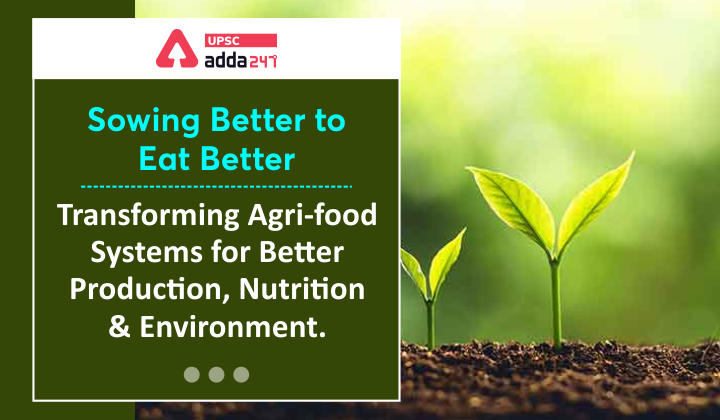Table of Contents
Sowing Better to Eat Better- Relevance for UPSC Exam
- GS Paper 2: Governance, Administration and Challenges- Issues relating to development and management of Social Sector/Services relating to Health and Human Resources.
- Issues relating to poverty and hunger.
Sowing Better to Eat Better- Context
- The findings from the first round of the Fifth National Family Health Survey suggest that nutrition-related indicators have worsened in most States.
- The survey covers 17 States and five Union Territories, which comprise 54% of India’s population.
- In addition, findings from the Comprehensive National Nutrition Survey (2016-18) have highlighted the role of micronutrient malnutrition.
Forest Conservation Act (FCA), 1980- Proposed Amendments to FCA
Sowing Better to Eat Better- Sow Better to Eat Better
- The health of a country’s agri-food systems determines the health of its people. A structural shift in dietary patterns and nutrition requires a shift in production.
- Pathways for nutritional security: consist of improving dietary diversity, kitchen gardens, and reducing post-harvest losses.
- It also consists of making the safety net programs more nutrition-sensitive, women’s empowerment, enforcement of standards and regulations, improving Water, Sanitation and Hygiene, nutrition education, and effective use of digital technology.
- Economic Importance of India’s agricultural system: India produces sufficient food, feed and fibre to sustain about 18% of the world’s population (as of 2020).
- Agriculture contributes about 16.5% to India’s GDP and employs 42.3% of the workforce (2019-20).
- Benefits of sustainable Agri-food systems:
- Food systems can help combat environmental degradation or climate change.
- Sustainable agri-food systems can deliver food security and nutrition for all, without compromising the economic, social and environmental bases.
Failing on Food- Status of Malnutrition in Children and PM POSHAN Scheme
Sowing Better to Eat Better- Associated Challenges
- COVID-19 and Climate Change: have exacerbated the nutrition issue, and challenged agricultural production itself.
- Indian agriculture is facing unprecedented challenges related to economic and ecological sustainability, nutrition and the adoption of new agricultural technologies.
- The edifice of India’s biosecurity remains vulnerable to disasters and extreme events.
FSSAI’s State Food Safety Index 2021
Sowing Better to Eat Better- Way Forward
- Adopting a multi-pronged approach: Policymakers should look at agri-food systems as a whole for addressing the complex problem of malnutrition.
- Reorienting Agri-food systems: to enhance farm incomes and also ensure better access to safe and nutritious foods.
- It should reorient to minimize cost on the environment and the climate.
- Steps taken by Food and Agriculture Organization (FAO):
- Organized World Food Day 2021 whose theme was- ‘Our actions are our future. Better production, better nutrition, a better environment and a better life.
- FAO has been engaged with the Indian government for mainstreaming agrobiodiversity, greening agriculture, promoting nutrition-sensitive agriculture and strengthening national food security.
Sowing Better to Eat Better- Conclusion
- A sustainable agri-food system is one in which a variety of sufficient, nutritious and safe foods are made available at an affordable price to everyone, and nobody goes hungry or suffers from any form of malnutrition.
- Less food is wasted, and the food supply chain is more resilient to shocks.




 TSPSC Group 1 Question Paper 2024, Downl...
TSPSC Group 1 Question Paper 2024, Downl...
 TSPSC Group 1 Answer key 2024 Out, Downl...
TSPSC Group 1 Answer key 2024 Out, Downl...
 UPSC Prelims 2024 Question Paper, Downlo...
UPSC Prelims 2024 Question Paper, Downlo...
